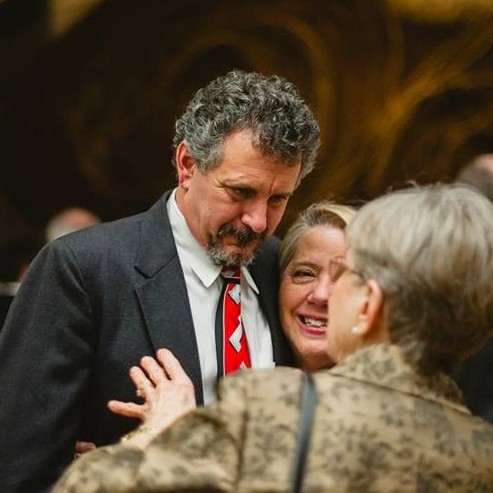How Did I Get Here?

How Did I Get Here?
Rev. Jonathan Eidson
September 10th, 2023
Exodus 12:1-14
Matthew 18:15-20
If you read the title of today’s sermon, you may have wondered if it referred to the passage from Exodus. Perhaps it does a little, but I also thought it would be good to stay with the theme from Tillie’s article in signposts, “How God Brought Us to This Moment.” And her sermon title last week was How I Got Here. Since she’s a person of wisdom, I decided to use a variation of that.
You may be asking yourself, “Why did he choose the passage from Exodus?” It has been my tradition to use an Old Testament and a New Testament passage from the lectionary selections to prepare my sermon when I preach. You can imagine my surprise when I read the passage from Exodus. I have us butchering animals this week and Hilary has us blessing them next week. That sounds just crazy enough for the Spirit to have been involved.
It’s tempting to take both of today’s passages literally but that causes us to miss their points. This passage from Exodus isn’t about what to eat. It’s about everyone having something to eat. It’s about the importance of ritual to help us remember. It’s about Passover. Old Testament scholar, John Holbert says, “The heart of the Passover is the desire to include all in the ritual and to make certain that all have enough, and none have more than they need.” Let’s hear that again, “The heart of the Passover is the desire to include all in the ritual and to make certain that all have enough, and none have more than they need.” He goes on to say, “One can see that this sort of sharing is intended to be a model for the larger society that too often presents some with far more than they need and many with far less.”[i]
That makes this passage relevant today. Did you know that two billion of our fellow humans live on roughly $2.00 a day while the 85 richest human beings on the earth control more resources than all of those two billion put together? Again, Holbert says, “Passover has at its heart a call to equality.” So, what can we learn from this text? Our sacred rituals are important for all of us who want to remember the cornerstone narrative of the faith and the ritual needs to reflect the meaning of the story. These rituals remind us of our part to ensure the equality of all participants and the hope for all the people of the world. As Christians, we have the important ritual of communion that helps us not only remember Christ’s death, but also his message of equality and caring for everyone when we take communion together.
As an aside, because you probably know how my brain works, let me say I feel certain that the only reason this Exodus passage doesn’t mention Impossible Lamb Burgers is because that option wasn’t available back then and to reiterate that it’s not about what to eat, I’ll just say none of my Jewish friends who celebrate Passover today do so with a “lamb pickin’.”
I know that the lectionary has been around for quite some time, but it still seems like the work of the Spirit to have these passages at this time in our life at Sardis. For one thing, our visioning process is helping us to discover who we are and who we’re going to be as we continue our journey, and both these passages talk about life in the church. For another thing, we really need the Spirit to help us understand the confusing placement of the New Testament passage we’ve heard today from Matthew. Several commentaries say that our New Testament passage from Matthew seems to be out of place. It is stuck between tender stories about the good shepherd and the lost sheep, and a story about forgiveness.
Alyce McKenzie says, “At first glance, this passage is like biting into a delectable looking sandwich only to find that the filling tastes ‘off’. It’s not the right filling for this sweet bread.” As a professor of preaching, she encourages her students to read each passage like they’re reading it for the first time and to reflect on their first impressions. She admits her first impression of this passage wasn’t good; she found it to be mundane and harsh. I agree, do you? We’re reading from Matthew 18 today. Since Jesus’ ministry in Galilee ends with chapter 17 in Matthew’s gospel and beginning in chapter 19 Jesus will turn toward Jerusalem and this cross, why would he spend time in chapter 18 on conflict management?
We all know that first impressions are sometimes worthless because they may be inaccurate. As Professor Mackensie searched for a deeper understanding, she says, “In hindsight, the inner life of the church, including conflict resolution, was a good choice of topic here at the hinge between Jesus’ life and his death. As the embodiment of the kindom of God on earth, it needed guidelines on how to be more than just another organization that needs members and money. It needed guidelines on how to be a countercultural body, in which ‘leaders serve instead of swagger,’ where the weak are nourished instead of cast aside, where people who lose their way are not forgotten but sought and restored, where people cultivate mercy and forgiveness as if they were the rare flowers of heaven.” Isn’t that a beautiful scene?[ii]
Tillie told us how she got here last week. I wanted to continue with the theme she started. There were some parallels between Tillie’s story and my own. We both had a near death experience. When I was a preschooler, I jumped into a pool without my float and almost drowned while our family was vacationing in Myrtle Beach. I have a vague memory of walking on the bottom toward the metal ladder. Most likely, I was bobbing and flailing enough to attract the attention of a woman who was also staying at the hotel, and who realized I was in trouble and dove in to scoop me up and take me out of the pool. Near death experiences offer a chance to zoom in on the meaning and purpose of our lives and through the years of remembering this story again and again, I have always been astounded by my second chance offered through a stranger’s attention.
I can’t remember a time in my life when the church wasn’t important. If church was meeting, we were there. My four grandparents where very involved in the church. My mother’s father was a pastor and my father’s father led music and his mother played the piano in their church. I learned many faith lessons from them. I remember going Saturday night to help mop the church and early Sunday morning to ring the bell. I would pull the rope and as the bell swung back it would pick me up off the ground. I also learned the importance of stewardship sitting on the bottom of five-gallon buckets with a hammer in one hand and a brick in the other gently tapping off the old mortar so the bricks could be reused in their building expansion.
In all of these gatherings, I wasn’t set aside while the adults did the work of the church. I was brought in to be a part of things. Mopping and ringing a bell don’t sound like important rituals, but I was contributing to a community, and that helps us all develop a sense of purpose and belonging. At some point there was a shift from my parents taking me any time the doors were open to me taking myself. In my teen years, I was a part of the youth choir that provided worship music for the early service each Sunday morning at my home church. Then, after evening worship, the youth always headed to Ken’s Pizza, not because of a scheduled event but because we wanted to be and enjoyed being together.
As you probably read in signposts, when I was in college, I would sometimes chaperone youth events. It was at a lock-out that I came to terms with my calling to ministry. I remember skating around with the youth while the other chaperones sat and watched. Meeting with my youth minister sometime after that, I remember asking him, “What does it feel like to be called to ministry?” He responded saying, “It feels exactly like what you’re feeling right now!” That’s a response I’ve shared with others who have asked me the same question.
I love the church and I love this church. In all the churches I’ve served, I loved helping people remember that there’s a place at the table already reserved for them. I love walking alongside people of all ages through the seasons, celebrations and sorrows of life. And I love reminding us all of the joy and purpose we find as we follow Jesus together. After many years as a youth and college minister at First Baptist Church of Raleigh, Anne and I moved our family to Charlotte for her to take a position as minister of music. Shortly after that, I took a position as interim youth minister. Not too many years after that, I became interim youth and children’s minister here at Sardis and I was delighted when you asked me to stay.
Let’s think about what these passages are saying to us this morning. They give us inspiration; they give us some guidelines and a vision. As we said earlier, “The heart of the Passover is the desire to include all in the ritual and to make certain that all have enough, and none have more than they need.” As has always been the tradition here, we include everyone in the ritual of communion and the life of the church.
We also need guidelines on how to be a countercultural body, in which “leaders serve instead of swagger, where the weak are nourished instead of cast aside, where people who lose their way are not forgotten but sought and restored, where people cultivate mercy and forgiveness as if they were the rare flowers of heaven.” When I read that quote, I thought of Sardis and speaking of Sardis, what has brought us to this moment?
We’re going to be searching for a new pastor. For most of us, it won’t be the first time we’ve done this and it likely won’t be the last. Those who have been through it before, know that we will need each other to get through this time of not knowing, which can feel anxious. We are strengthened by being present with one another. Some of us may feel impatient at times but hopefully not all of us at the same time. Let us be gentle with one another. Prayer is an essential part of the process. Trust in God who is moving ahead of us and beside us. I remember when Pastor Tim resigned and I wondered, “How are we going to get someone wonderful like Tim as a part time pastor?” We got Pastor Bob. When Bob told me he was going back to Millbrook, I immediately thought, “How are we going to get someone wonderful like Bob? God brought us through before and God will bring us through again. Do you believe it? May it be so and may it be soon!
[i] Holbert, John; Narrative Ritualized…but Pay Attention! Reflections on Exodus 12:1-14; Patheos, September 7, 2014
[ii] McKenzie, Alyce; Trip Advisor Comments: Reflections on Matthew 18:15-20; Patheos, September 4, 2011.
Recent Sermons
Easter Sunday 2025
April 20, 2025
Palm Sunday 2025
April 13, 2025
Our Choices
April 06, 2025


